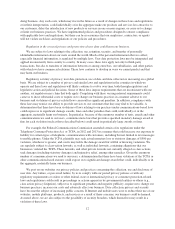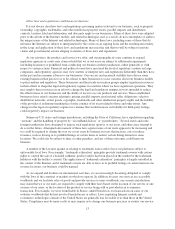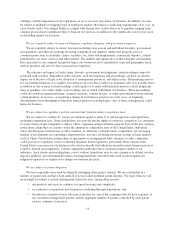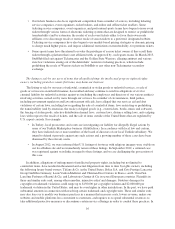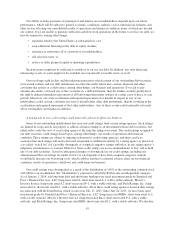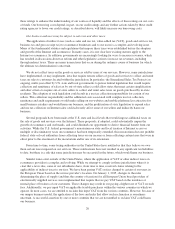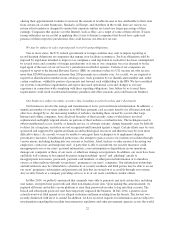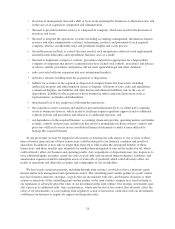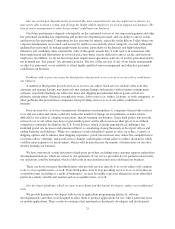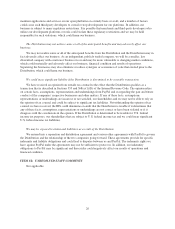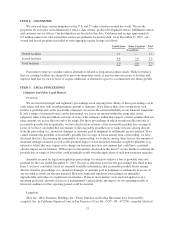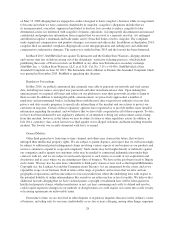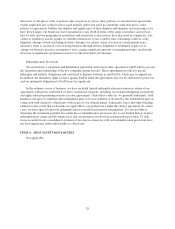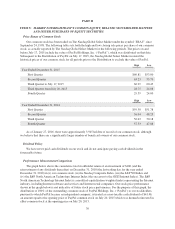eBay 2015 Annual Report Download - page 34
Download and view the complete annual report
Please find page 34 of the 2015 eBay annual report below. You can navigate through the pages in the report by either clicking on the pages listed below, or by using the keyword search tool below to find specific information within the annual report.altering their apportionment formulas to increase the amount of taxable income or loss attributable to their state
from certain out-of-state businesses. Similarly, in Europe, and elsewhere in the world, there are various tax
reform efforts underway designed to ensure that corporate entities are taxed on a larger percentage of their
earnings. Companies that operate over the Internet, such as eBay, are a target of some of these efforts. If more
taxing authorities are successful in applying direct taxes to Internet companies that do not have a physical
presence in their respective jurisdictions, this could increase our effective tax rate.
We may be subject to sales reporting and record-keeping obligations.
One or more states, the U.S. federal government or foreign countries may seek to impose reporting or
record-keeping obligations on companies that engage in or facilitate ecommerce. Such an obligation could be
imposed by legislation intended to improve tax compliance (and legislation to such effect has been contemplated
by several states and a number of foreign jurisdictions) or if one of our companies was ever deemed to be the
legal agent of the users of our services by a jurisdiction in which it operates. Certain of our companies are
required to report to the Internal Revenue Service (IRS) on customers subject to U.S. income tax who receive
more than $20,000 in payments and more than 200 payments in a calendar year. As a result, we are required to
request tax identification numbers from certain payees, track payments by tax identification number and, under
certain conditions, withhold a portion of payments and forward such withholding to the IRS. We have modified
our systems to meet these requirements and expect increased operational costs and changes to our user
experience in connection with complying with these reporting obligations. Any failure by us to meet these
requirements could result in substantial monetary penalties and other sanctions and could harm our business.
Our business is subject to online security risks, including security breaches and cyberattacks.
Our businesses involve the storage and transmission of users’ personal financial information. In addition, a
significant number of our users authorize us to bill their payment card accounts directly for all transaction and
other fees charged by us. An increasing number of websites, including those owned by several other large
Internet and offline companies, have disclosed breaches of their security, some of which have involved
sophisticated and highly targeted attacks on portions of their websites or infrastructure. The techniques used to
obtain unauthorized access, disable, or degrade service, or sabotage systems, change frequently, may be difficult
to detect for a long time, and often are not recognized until launched against a target. Certain efforts may be state
sponsored and supported by significant financial and technological resources and therefore may be even more
difficult to detect. As a result, we may be unable to anticipate these techniques or to implement adequate
preventative measures. Unauthorized parties may also attempt to gain access to our systems or facilities through
various means, including hacking into our systems or facilities, fraud, trickery or other means of deceiving our
employees, contractors and temporary staff. A party that is able to circumvent our security measures could
misappropriate our or our users’ personal information, cause interruption or degradations in our operations,
damage our computers or those of our users, or otherwise damage our reputation. In addition, our users have been
and likely will continue to be targeted by parties using fraudulent “spoof” and “phishing” emails to
misappropriate user names, passwords, payment card numbers, or other personal information or to introduce
viruses or other malware through “trojan horse” programs to our users’ computers. Our information technology
and infrastructure may be vulnerable to cyberattacks or security incidents and third parties may be able to access
our users’ proprietary information and payment card data that are stored on or accessible through our systems.
Any security breach at a company providing services to us or our users could have similar effects.
In May 2014, we publicly announced that criminals were able to penetrate and steal certain data, including
user names, encrypted user passwords and other non-financial user data. Upon making this announcement, we
required all buyers and sellers on our platform to reset their passwords in order to log into their account. The
breach and subsequent password reset have negatively impacted the business. In July 2014, a putative class
action lawsuit was filed against us for alleged violations and harm resulting from the breach. The lawsuit was
recently dismissed with leave to amend. In addition, we have received requests for information and are subject to
investigations regarding this incident from numerous regulatory and other government agencies across the world.
22


